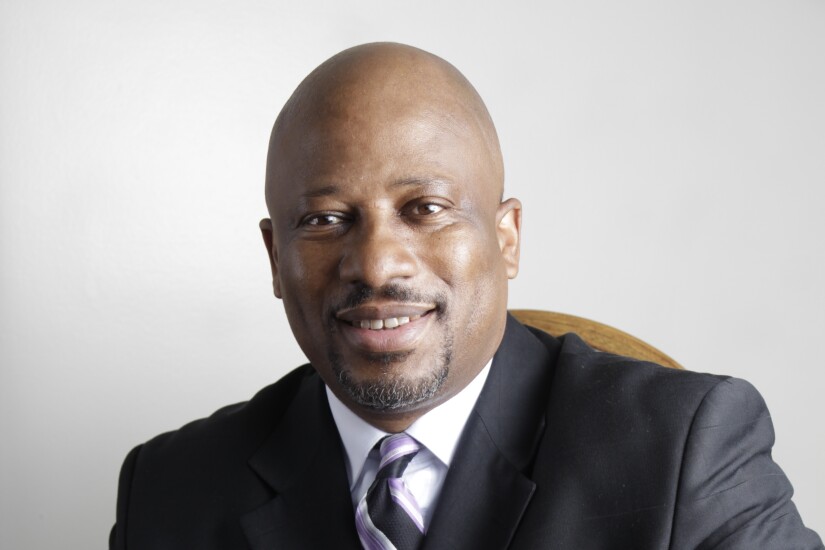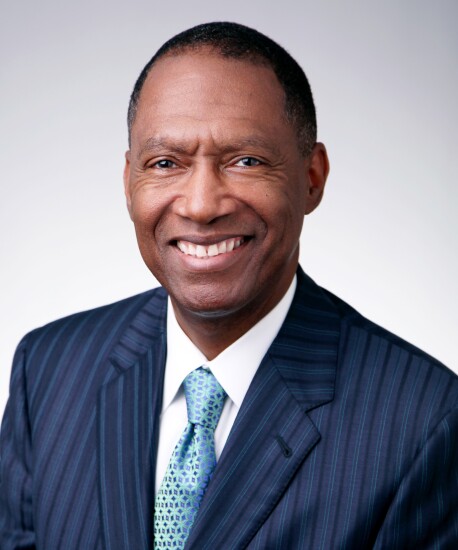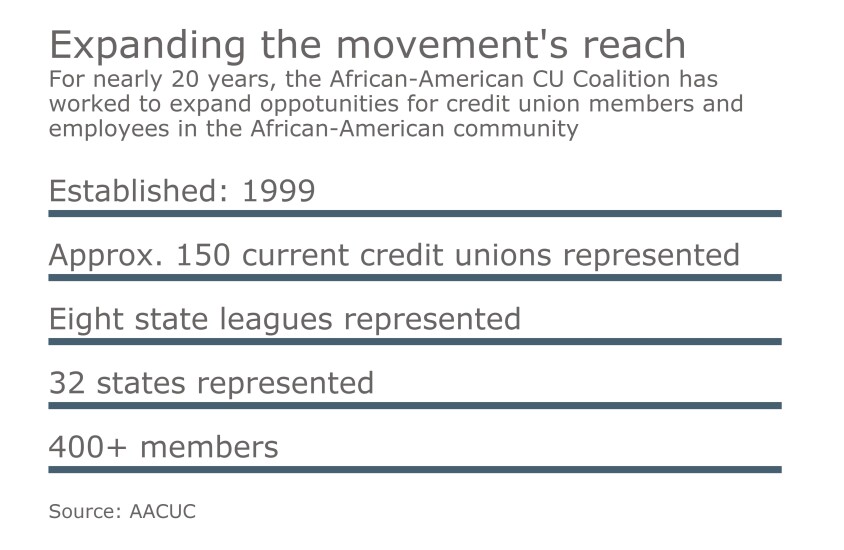
How have African-Americans fared in the credit union movement?
Note: Some responses have been edited for length and/or clarity.

Lynette Smith, president/CEO, Washington Gas Light FCU, Springfield, Va.
AACUC is committed to this type of mentorship. It is this type of mentorship that opened up the door for me. It also exposed me to other organizations, as well. We work with CUNA and NAFCU and get good support from them.
While we don’t have a formal mentorship program, our annual conference and the networking event we host at CUNA’s GAC gives people the opportunity to make contacts that can help you grow. Sometimes, you can’t go to your boss when you’re looking to develop yourself. The chance to network with other executives gives you the opportunity to meet someone who could look over your resume, for example.
We mentor credit unions that are in trouble and provide consulting as needed, but it’s also about developing emerging leaders. Our internship is a stellar program. We’ve had more than 300 students come through the internship program and some of them are still in the industry now.
I do think credit unions, as a community, need to be more proactive about developing African-American leaders.

Bill Bynum, CEO of Hope Credit Union (and Hope Enterprise Corporation and Hope Policy Institute), Jackson, Miss.
Credit unions do a good job, in general, of serving people of color, but we could do better. We’re leaving a lot on the table. I’ve seen some credit unions that are not very different from community banks in terms of outreach, and you don’t see the diversity on the staff, management and boards. Our governance and structure need to be reflect who we serve. We have found it very effective to be intentional when we are hiring.
We need to act in alignment with the needs of the community. That includes our products and services, such as credit building products. We have to be more flexible on underwriting if we are going to help the credit invisible, using alternatives to the typical credit report.
We have found it is very effective to locate in communities of higher need. Where the banks left, we have tripled our presence. We went from seven branches in 2008 to 30 branches today, many of them in what we call bank deserts.
I go to credit union conferences, and they’re not as diverse as they should be. We need to do more — recruiting staff and directors, developing staff and putting them on the management track.

Tonita Webb, EVP/COO, Seattle Metropolitan CU
One reason we need to start earlier is the younger generation coming in expects to CFO two days after they get here. We need to balance those unrealistic expectations, but we also need to make sure we show them there IS a path to get them where they want to go.
The other reason we need to start sooner is our tendency to not want to think about “who will replace me when I leave.” We have to recognize the sun is going to set, and we can’t wait to start developing the talent and leadership of the future.
I think what we have to figure out is how not to separate history. It’s important to flag the Black experience, both in the credit union movement and in our nation, but one day, we need to make it so it’s just part of the total history.
My grandparents were born slaves, so even long after they were free, they were scared to speak up and say things, to stand up for themselves. But their children came of age in the 1960s, so they grew up marching and demonstrating. These two generations cannot relate to each other. But just as in the workplace we have to figure out how baby boomers and Generation X and millennials can work together and relate to each other, we also have to figure out how to bring all of our histories together.

Mark Brantley, director of Municipal CU, New York, and vice-chairman and advocacy chair of the AACUC.
African-Americans need to know about the credit union difference and that there are minority depository institutions (MDIs) that understand their financial needs. MDIs play a unique role in the African-American community because they are familiar with the demographic they serve. For this reason, the National Credit Union Administration – as part of its regulatory examination process – should take into account the specific and sometimes unique credit needs of African-Americans in a given area served by MDIs. Examinations should not be a one-size-fits-all process. Therefore, examiners should be sensitive to the memberships of MDIs and the credit union’s need to take on more credit risk.
MDIs are a critical component of the credit union movement and the NCUA can make affirmative steps to preserve them. Moreover, MDIs should be referred to organizations like the AACUC for assistance in the early stages of their poor performance and not when liquidation or merger appears to be imminent. It is my hope that the new NCUA administration will fully empower its Office of Minority and Women Inclusion (OMWI) to engage MDIs and to bring awareness to the programs and assistance available to them for their preservation.

Timothy L. Anderson, president and CEO, Government Printing Office FCU
At the AACUC our objective is to increase diversity within the credit union community and develop leaders through advocacy and professional development. Our signature outreach is our Internship Program, where we partner with Historical Black Colleges and Universities (HBCUs), introducing the credit union movement. Students work during the summer at credit unions, and many are hired after college. Credit unions make a difference in the lives of African-Americans. Can we do more? Yes, we must continue to support MDIs to ensure they are viable and thriving so they can help the communities other financial institutions ignore. Recently I was in Rwanda, Africa speaking at a credit union conference, with approximately 40 countries in attendance. It was extraordinary to see the cooperative movement growing globally throughout Africa.

Maurice R. Smith, president, Local Government FCU
The credit union story is replete with heroes and tales of helping people live better lives. The challenges of improving society can be a daunting mission. Strongly rooted economic factors have confined some communities for generations. Credit unions offer all people an opportunity to control their destinies through full participation in financial governance. This is the beauty and strength of the cooperative movement.
As we celebrate the history of African-Americans, let’s not forget to focus on the future of African-Americans. In some ways, the African-American community is not unlike any other group of people. We aim for economic success. We aspire to raise our children in safe homes. We want equality and open opportunities to succeed in life. Our history is settled. Our future needn’t be.
Fully connecting with the African-American experience can be a competitive advantage for the credit union movement. Cooperative democracy implies that diversity is a strength. To this end, all voices should be full participants in the credit union world. This means achieving broad representation from teller lines to boardrooms. If we rely on our cooperative instincts to be inclusive, we will achieve our mission to help all communities. Now, that’s something to celebrate.

Sheila Montgomery, board director, 1st Choice CU, Atlanta
After the Katrina Hurricane, the devastation of small credit unions was enormous. Mrs. Godfrey-Smith, then chair of AACUC’s mentorship committee, mobilized a group of credit union professionals to help restore as many small credit unions as possible. A daunting task. Fast forward, we are still doing that today.
Our goal is to:
· Actively participate in the sustainability of small credit unions
· Provide a non-threatening environment for credit union to seek assistance without judgment
· Be an advocate for underserved and unbanked communities
· Identify technological resources to improve efficiency and to help with service delivery
Small credit unions are “little hidden treasures” that provide help for individuals and families that have few options for affordable financial products and services due to banks moving out of their communities.
What we do:
· Provide strategic planning, marketing strategies for growth, write policy, assist with net worth plans
· Help identify resources to meet short term and long term needs
· Work with NCUA, its Office of Small Credit Union Initiatives and the National Federation of Community Development Credit Unions to be advocates for individual credit unions as needed and support the survival of small credit unions as a whole
Financial discrimination has been a real problem in underserved and unbanked communities. The type of loans needed in those communities are not often found in more traditional financial institutions.
For example: members are more likely to borrow to pay rent, utilities, car insurance, funeral expenses and even food/clothes for their children. They may not know what to ask for therefore, more likely than not, they receive unfavorable terms, higher interest rates and/or fees.
The small credit union has to be that financial niche that provide the small loans, fair rates, and more importantly, lend based on character and capability first, then credit.






